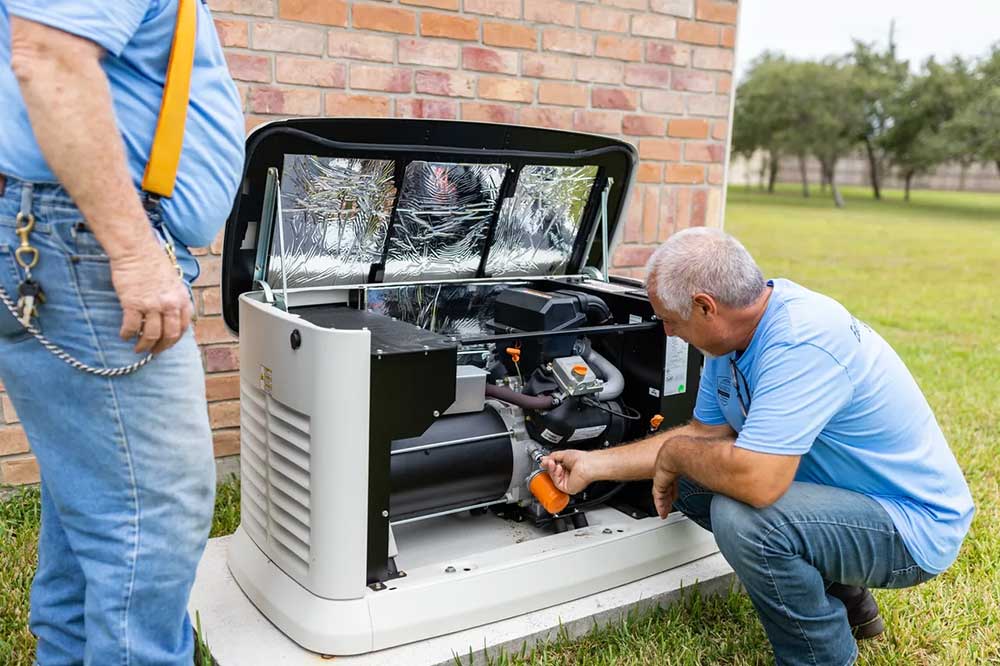Considering the recent blackouts in Texas, and the 2019 outages in California, the home backup power industry is more essential than ever. And it’s also more varied than ever, due to cost-competitive solar generation and battery backup competing on the home generator’s turf.
There are pros and cons to consider when deciding between portable vs. standby generators, and solar battery backup vs. generators. There’s also the hybrid option of combining solar panels with a backup generator. This article, built on the knowledge of our Square D™ residential energy experts, explores each approach to help you decide.

Portable generators vs. standby generators vs. solar
Prepare for the next outage by weighing the pros and cons of short-term versus long-term fixes.
1) Short-term: portable generators
Let’s start with portable generators: a quick and easy power source for your home. These affordable machines typically run on either gasoline or diesel fuel. To play it safe, budget at least $30 per day for fuel costs.
Choosing the right size portable generator is important because it’s possible for them to overload. Overloads happen when you use more watts than your generator can handle, resulting in machine deterioration, fire, and possibly even an explosion.
To determine the correct portable generator for your home, consider making an appointment for an estimate with a utility provider such as Solar Power Integrator. This system captures device-level data on your household’s energy consumption and provides a clear picture of how many watts each appliance is using. Armed with this information, you can properly size a generator for your home.
A licensed electrician can also use the data from your home energy monitor to help you identify critical loads in your electrical panel and determine the best way for you to switch these loads on or off. For example, you may want your refrigerator and lights to remain on but you can do without your washer, dryer, and dishwasher.
The bottom line: Portable generators for the home are suitable when you require immediate power to your critical loads with low upfront costs, but they require manual startup, take time to turn on during an outage, and incur ongoing fuel costs. Another factor to consider is that many portable generators are quite noisy.
2) Long-term: standby generators
Standby generators, also known as pad-mount generators, are permanent household fixtures installed outside your home on a concrete pad. The unit size you need depends on your home’s square footage. During an outage, pad-mount generators power on automatically and continue running indefinitely, most often using your home’s natural gas or propane.
Although they cost considerably more than portable models when you factor in installation, a standby generator’s automatic operation and stress-free refueling provide peace of mind to homeowners in energy-inconsistent regions.
3) Long-term: solar with battery backup
One of the cleanest energy solutions during an outage comes from solar power. However, most household solar panel systems feed directly into the main power grid, meaning they stop working during an outage and won’t produce energy again until the utility starts up. That’s why you’d still need to combine your solar panels with a generator or battery.
To maintain power when the grid goes down, you can purchase either an off-grid residential solar power system or install a battery backup system that stores energy generated from the solar panels and switches on in the event of a power failure. For many years, the price of batteries made this approach cost prohibitive. Fortunately, the price of batteries has plummeted 89 percent between 2010 – 2020, and storage is rapidly approaching cost competitiveness compared to standby generators.
Once residential solar and battery storage systems are purchased and installed at your home, energy generated from your panels is free and will power your critical loads indefinitely if the solar array is sized correctly.
Prepare now by understanding your energy use
Although we can’t predict the next big outage, we know that with worsening weather conditions and increased stress on the existing grid, it’s just a matter of time
Prepare early by taking a deeper look at your home’s energy use using Wiser Energy. Not only will this monitor help you understand your backup power needs, but it also collects real-time information on your energy use — allowing you to make split-second decisions that extend the life of your backup energy source during an outage.
